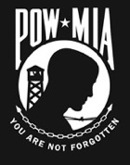 |
- OTHER SERVICES VOICES:
- MARINES
 - NAVY
 - AIR FORCE
 - ARMY
 - COAST GUARD
 - POLICE
|
An up close and personal interview with U.S. Air Force Veteran and Togetherweserved.com Member:
SSgt Dale VanBlair US Army Air Force (1942-1945)
WHAT INFLUENCED YOUR DECISION TO JOIN THE MILITARY?
As a machinist at Rock Island Arsenal, I was deferred; however, my patriotism ultimately took over, and I enlisted on 11/2/42. One factor in my choosing the Army Air Forces was seeing a short film by Jimmy Stewart about the advantages of the AAF.
WHAT WAS YOUR SERVICE CAREER PATH?
 After completing Basic Training at Kelly Field In January, 1943 I was sent to Buckley Field near Denver to go through Armorer's School to learn to install and maintain fighter plane armament. On completing that training I volunteered to go to Aerial Gunnery School at Harlingen Field, Harlingen Texas and .was subsequently assigned to the 448th Bombardment Group as a Tail Gunner with the Alfred H. Locke crew. On completing training, the 448th was attached to the 8th Air Force in England. After our eighth mission, our crew was transferred to the 564th BS, 389th BG to serve as a lead crew on a radar-equipped B-24. On 4/29/44 we led a group to Berlin, sustained flak and fighter damage, and were forced to ditch in the North Sea. That was my 18th and last mission, for I was grounded because of injuries. I then served as Squadron Gunnery Sergeant for the 564th until returning to the U.S. In October, 1944. I then served as a clerk/typist in an office on the flight line at Lowry Field, Denver, Colorado, until my discharge on October 4, 1945. After completing Basic Training at Kelly Field In January, 1943 I was sent to Buckley Field near Denver to go through Armorer's School to learn to install and maintain fighter plane armament. On completing that training I volunteered to go to Aerial Gunnery School at Harlingen Field, Harlingen Texas and .was subsequently assigned to the 448th Bombardment Group as a Tail Gunner with the Alfred H. Locke crew. On completing training, the 448th was attached to the 8th Air Force in England. After our eighth mission, our crew was transferred to the 564th BS, 389th BG to serve as a lead crew on a radar-equipped B-24. On 4/29/44 we led a group to Berlin, sustained flak and fighter damage, and were forced to ditch in the North Sea. That was my 18th and last mission, for I was grounded because of injuries. I then served as Squadron Gunnery Sergeant for the 564th until returning to the U.S. In October, 1944. I then served as a clerk/typist in an office on the flight line at Lowry Field, Denver, Colorado, until my discharge on October 4, 1945.
DID YOU PARTICIPATE IN COMBAT OPERATIONS? IF SO, COULD YOU DESCRIBE THOSE WHICH WERE SIGNIFICANT TO YOU?
My crew went on missions with the 715th BS, 448th BG until March 1944, when we were transferred to the 564th BS, 389th BG to fly as a lead crew for the B-24 groups with the 2nd Air Division.
Two missions stand out in my memory. One was the first major  daylight raid on Berlin on March 6, 1944. Although I was a tail gunner, for this mission I was drafted to man the nose turret for another crew. When we approached Berlin and I saw how heavy the flak was, I knew for the first time what real fear felt like. daylight raid on Berlin on March 6, 1944. Although I was a tail gunner, for this mission I was drafted to man the nose turret for another crew. When we approached Berlin and I saw how heavy the flak was, I knew for the first time what real fear felt like.
The second was my 18th mission on 4/29/44 when we led the 466th B.G. to Berlin. As a result of flak and fighter damage we were forced to ditch in the North Sea, with the loss of five of twelve crew members (we had two extra navigators because of being a lead crew). I spent an hour in the cold North Sea, longer than one was supposed to survive, supported by my Mae West life vest. I was unconscious from hypothermia when finally picked up by an English air-sea rescue launch. I spent a week in the hospital recovering from a skull fracture, then developed spinal meningitis as a result of the hour I spent in the frigid water and spent another three weeks in the hospital. The only permanent after-effect of the experience was complete loss of hearing in my right ear as a result of the spinal meningitis.
WHICH, OF THE DUTY STATIONS OR LOCATIONS YOU WERE ASSIGNED OR DEPLOYED TO, DO YOU HAVE THE FONDEST MEMORIES OF AND WHY?
That would be Lowry Field, Denver, Colorado, where I was stationed after returning to the US. Denver was a great town for Soldiers.
FROM YOUR ENTIRE SERVICE CAREER WHAT PARTICULAR MEMORY STANDS OUT?
 Aside from ditching in the North Sea, it is the death of a very close friend. Al Spadafore, the Ball Turret Gunner on my crew, and I had become more than just friends, we were more like brothers. Where one was, you were likely to find the other. Aside from ditching in the North Sea, it is the death of a very close friend. Al Spadafore, the Ball Turret Gunner on my crew, and I had become more than just friends, we were more like brothers. Where one was, you were likely to find the other.
On March 8, 1944, Al was drafted to replace a wounded Ball Turret Gunner of another crew. They were forced to ditch, and Al was one of eight who were lost.
On learning what had happened, I cried and was not ashamed of the tears I shed. I am still in touch with the lady who was his fiancee.
WERE ANY OF THE MEDALS OR AWARDS YOU RECEIVED FOR VALOR? IF YES, COULD YOU DESCRIBE HOW THIS WAS EARNED?
I guess the Air Medal might qualify for this. In the Eighth Air Force, it was awarded for every five mission that one survived. Considering that only about one-third of the men completed the required number of missions at the time my crew was going on missions, it took courage to keep going when you knew your chances of surviving weren't too good. Statistics show that  the Army Air Forces had the highest casualty rate of any branch of service. the Army Air Forces had the highest casualty rate of any branch of service.
OF THE MEDALS, AWARDS AND QUALIFICATION BADGES OR DEVICES YOU RECEIVED, WHAT IS THE MOST MEANINGFUL TO YOU AND WHY?
My Purple Heart that was awarded because of the injuries I received when my crew was forced to ditch. When my pilot tried to set the plane down on the surface of the North Sea, a large wave caught the nose of the plane. I was plunged beneath the surface and had reached the point where I knew I could no longer hold my breath another second, when my head suddenly broke above the surface.
WHICH INDIVIDUAL PERSON FROM YOUR SERVICE STANDS OUT AS THE ONE WHO HAD THE BIGGEST IMPACT ON YOU AND WHY?
That would be the Ball Turret Gunner on my crew. As I wrote in answering a previous question, we became more than just friends, and his death that came when he was drafted to fly with another crew was a major blow to me. When I had to go on a mission the day after his death, my morale was about as low as it could be and I had little hope left that I would survive the required number of missions.
CAN YOU RECOUNT A PARTICULAR INCIDENT FROM YOUR SERVICE THAT WAS FUNNY AT THE TIME AND STILL MAKES YOU LAUGH?
During the final two weeks of Aerial Gunnery School we were required to go up several times in an AT-6 and fire at a towed target. Many of the Second Lieutenants who flew the planes for us were unhappy with their assignment and wished to complete their flights as quickly  as possible. Consequently, if a machine gun malfunctioned in the air and could not be fixed, the pilot had to land so that the student could install another gun and then take him back up again. as possible. Consequently, if a machine gun malfunctioned in the air and could not be fixed, the pilot had to land so that the student could install another gun and then take him back up again.
Some pilots, when a gun malfunctioned, would tell the student gunner to drop the ammunition over the side so that he pilot didn't have to make a second flight and the student got credit for firing the required number of rounds. Since we did our target practice over the Gulf of Mexico, there was little chance that the deception would be discovered. When one of the men in my barracks, who had a reputation of being a little dense, had his gun to malfunction, the pilot shouted, "Throw it [meaning the ammo] over the side." The student promptly picked up both gun and ammunition and dropped it all over the side. Needless to say, he did not finish Gunnery School.
We, of course, found it hilarious, and I still occasionally tell the story to someone who hasn't heard it.
WHAT PROFESSION DID YOU FOLLOW AFTER THE SERVICE AND WHAT ARE YOU DOING NOW? IF CURRENTLY SERVING, WHAT IS YOUR CURRENT JOB?
I used the GI.Bill to go through college with a major in English. On graduating I began teaching High School English and spent my last seventeen years as English Department Chairman in a large High School in Belleville, IL, where I supervised from thirty to forty teachers, depending on student enrollment.
I retired in 1982 and since then have spent much of my time fishing and bowling. Even though I will be 90 on June 17 of this year, I am still bowling four times a week and am carrying about a 182 average.
WHAT MILITARY ASSOCIATIONS ARE YOU A MEMBER OF, IF ANY? WHAT SPECIFIC BENEFITS DO YOU DERIVE FROM YOUR MEMBERSHIPS?
I belong to the VFW. I can't say that I derive much benefit because I rarely attend meetings. After a few meetings, I got turned off by the quasi military way in which meetings were conducted: saluting, etc. VFW members are civilians, not members of the military.
HOW HAS MILITARY SERVICE INFLUENCED THE WAY YOU HAVE APPROACHED YOUR LIFE AND CAREER?
 As one of my friends said a few years ago when we were discussing our WWII years, "I wouldn't take a million dollars for the experience, and I wouldn't take a million to repeat it." My three years in the AAF developed something that I had lacked before: a confidence in my ability to handle about any situation that might arise. Had it not been for my growth during those three years, I doubt that I would have become English Department Chairman. Situations sometimes arose that required that I defend an English teacher or department policy, something I would have found difficult without the self-confidence that I developed during my years of service. As one of my friends said a few years ago when we were discussing our WWII years, "I wouldn't take a million dollars for the experience, and I wouldn't take a million to repeat it." My three years in the AAF developed something that I had lacked before: a confidence in my ability to handle about any situation that might arise. Had it not been for my growth during those three years, I doubt that I would have become English Department Chairman. Situations sometimes arose that required that I defend an English teacher or department policy, something I would have found difficult without the self-confidence that I developed during my years of service.
WHAT ADVICE WOULD YOU HAVE FOR THOSE THAT ARE STILL SERVING?
Think twice before deciding to volunteer for anything and then think a third time before actually doing it.
IN WHAT WAYS HAS TOGETHERWESERVED.COM HELPED YOU MAINTAIN A BOND WITH YOUR SERVICE AND THOSE YOU SERVED WITH?
I've found only two men who served in one of the two bombardment groups that my crew was assigned to during our time with the 8th Air Force, neither of whom I knew. However, being able to read about the experiences of post-WWII vets has been meaningful to me.
|
|
|
Share this Voices Edition on:



 |
|
TWS VOICES
TWS Voices are the personal stories of men and women who served in the US Military and convey how serving their Country has made a positive impact on their lives. If you would like to participate in a future edition of Voices, or know someone who might be interested, please contact TWS Voices HERE.
This edition of AirForce Voices was supported by:
AirForce.Togetherweserved.com
For current and former serving Members of the United States Air Force, Army Air Corps, Air Force Reserve and Air National Guard TogetherWeServed is a unique, feature-rich resource helping Airmen reconnect with lost Wingmen, share memories and tell their Air Force story.
To join AirForce.Togetherweserved.com, please click HERE.
|
|